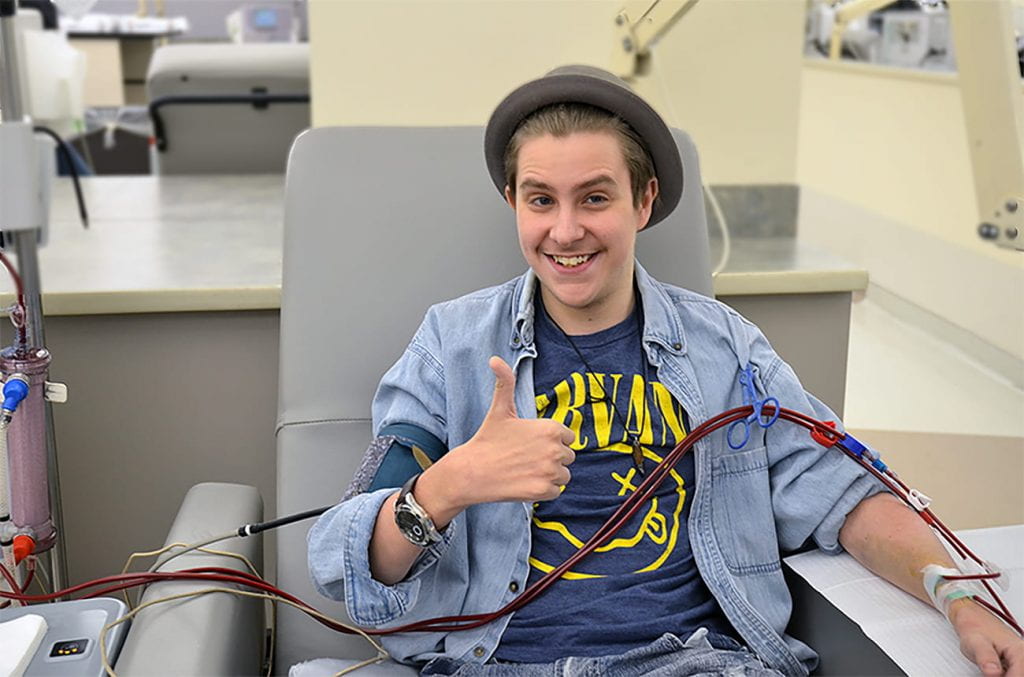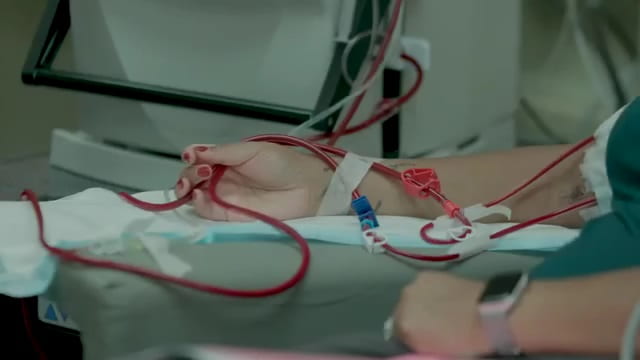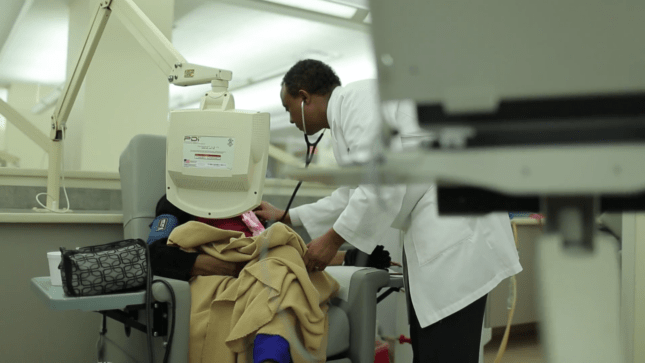When your kidneys fail and can no longer remove toxins and waste from the body, you will need to consider medical options for removing those toxins before they become harmful. One of those options is dialysis.

What is in-center hemodialysis?
Hemodialysis is performed by a machine that filters waste, removes extra fluid and balances electrolytes (sodium, potassium, bicarbonate, chloride, calcium, magnesium and phosphate). For In-center hemodialysis, you will travel to a dialysis center three times a week to have your blood filtered by a dialysis machine. Each dialysis session lasts three to four hours.
What to expect with in-center hemodialysis treatment?
Hemodialysis treatments are usually three times a week for approximately 3-4 hours per dialysis session. The actual time will depend upon your body size, overall medical condition and your laboratory blood test results. Most centers schedule dialysis treatments on shifts either Monday, Wednesday, Friday or on Tuesday, Thursday, Saturday. Appointment times for treatments are usually from 6:00 am to 3:00 pm. You will be scheduled at the same time each day for your treatments.
What are the advantages of doing in-center hemodialysis?
- In-center hemodialysis can be reassuring to patients because immediate expert help is always at hand.
- Experienced dialysis nurses and technicians are available to answer questions and handle any complications that may arise. A renal care physician, or nephrologist, is also available for consultations.
- You will not have to worry about receiving and storing adequate dialysis supplies in your home.
- Some of the challenges with in-center hemodialysis include arranging transportation, making sure you are at the center three times per week as scheduled and organizing your activities around your dialysis schedule.
What does a typical day of in-center hemodialysis look like?
When you arrive at the dialysis center you will have your weight checked. This is very important to determine the settings on your dialysis machine for removal of excess fluid from your body. Each patient is assigned a dialysis station with a separate dialysis machine and a reclining chair.
Next, a nurse or technician will hook you up to the dialysis machine by placing two needles in your “vascular access.” One needle removes the blood from your body through a tube and it goes to the dialysis machine. The other returns “clean” blood to your body from the dialysis machine. (See here for more detailed information about the types of vascular access,)

The whole dialysis treatment will take between 3-4 hours. You will have the opportunity to watch television on an individual monitor, read, or even sleep while undergoing dialysis. Patients often feel more comfortable if they bring a blanket to each session. Once your treatment is complete, the needles will be removed by a nurse or technician and you will be disconnected from the machine. The machine is thoroughly disinfected after each use. All staff members are trained in procedures to minimize the risk of infection or other problems.
You will be weighed again at the end of your treatment to check how much fluid was removed during your dialysis treatment. After everything is completed, you can drive yourself or wait for transportation to pick you up from the dialysis center.
What is your role in in-center hemodialysis?
There are important things to note if you choose in-center dialysis:
- You must be an involved partner in your care along with your physician and renal team. This includes not only going to every scheduled doctor visit and dialysis session, but also making sure your diet and exercise activities are in line with your prescribed plan.
- It is helpful to have an identified caregiver, friend or partner who understands the need for dialysis, knows the symptoms that can cause concern and can help you should there be a problem.
- You may be able to change the type of dialysis you use. You may first feel more comfortable having dialysis at a treatment center. If you desire, you may be able to switch to doing dialysis at home. Your dialysis team will work directly with you to customize your dialysis plan and train you and a caregiver appropriately no matter which type of dialysis modality you choose.
- You must keep your scheduled appointments at a dialysis center. Skipped or shortened treatments will put your health in danger.
Patient care team
Patients are usually seen by a doctor or nurse practitioner 2 to 4 times per month to assess progress, look for problems or answer questions related to dialysis.
Learn more about your care team »

Emergency care
A renal care physician is on call 24 hours a day, seven days a week if you have concerns either in the dialysis center or at home. Emergency care is available through the Barnes-Jewish Hospital Emergency Department.
Dialysis Center Locations
We offer comprehensive services at multiple dialysis centers conveniently located throughout the metro St. Louis area. This is part of our mission to take our outstanding care to the communities where our patients live. All centers are open six days a week, Monday through Saturday. Around major holidays, the centers may also be open on Sundays.
While the majority of dialysis centers are open from early morning to late afternoon or early evening, one site – the West Healthcare Dialysis Unit at 400 N. Lindbergh – offers evening and overnight hours three days a week (M, W, F) through its Nocturnal Dialysis Program.
Most patients in the United States choose to receive dialysis treatments in a hemodialysis center near where they live. A hemodialysis center usually has 12 to 32 dialysis stations. Nurses or dialysis technicians perform the treatment while patients sit in reclining chairs.
Common Questions about in-center hemodialysis
Will I need to change the way I eat once I start dialysis?
You will be assigned to a dietitian who will work directly with you and your family to plan meals and guide you on the right food choices. Your dietitian will meet with you at least once a month to go over results from laboratory blood tests and adjust your diet accordingly.
Learn more about diet and your kidneys »
Will I need to change the activities I do regularly after starting dialysis?
Thousands of people maintain active lives while undergoing regular dialysis. With careful scheduling around your dialysis treatments, you may be able to continue to work and keep up with leisure activities, even travel.
If you are not able to continue working due to disability once you start dialysis, you can apply for Social Security Disability Insurance by calling 1-800-772-1213. You can also apply at the local social security office or through the human resources department at your place of employment.
How will I get to and from the dialysis center?
If you need transportation to dialysis and meet eligibility requirements, state Medicaid may cover costs to get you to and from your dialysis center. It may take a few weeks to get the paperwork turned in and approved by Medicaid, however, so you should plan on finding your own transportation for the first 10 dialysis treatments. Social workers at the dialysis unit will assist you with transportation planning. You may need help from friends and family to get you to and from your treatments.
How will I cover my expenses from dialysis?
Everyone who needs hemodialysis will receive the appropriate medical treatment. Washington University charges for doctor’s services. Barnes-Jewish Hospital charges for tests and procedures. Staff from both billing offices will determine your insurance coverage for dialysis. If your insurance plans are out of network for either or both services, causing a very high co-pay, we will help you find the best dialysis unit that your insurance will cover.
You may already have or be eligible for Medicare. Medicare will combine with your health insurance to cover dialysis costs. If you have group health insurance from your job, Medicare will be a secondary insurance for the first 30 months of dialysis.
Medicare usually becomes the primary payer after 30 months, no matter what your age is. If you do not have Medicare at this time, Medicare will start to pay for your hemodialysis treatment at a center on the first day of your third full month of hemodialysis. The social workers and business office will help you apply for Medicare. State Medicaid also pays for dialysis. Medicare Part D will help pay for medications.
How will I feel once I start dialysis?
It may be difficult to adjust to dialysis therapy. You and your family may be anxious and overwhelmed with all you have learned, the decisions and plans. This is normal and expected. It’s important to note though, most people feel their lives get back to normal in a short period of time after starting dialysis and are able to adjust to treatments and medications. Talk to your family, health care team, spiritual advisor and social worker for help with coping with the stress associated with your initial adjustment.
Will I be able to travel after starting dialysis?
If you travel for business or pleasure, you can still learn to dialyze on the go. The key is to plan in advance. First, check with your physician to see if it is okay to travel. Then, tell the dialysis team your travel dates so we can help coordinate referrals and insurance coverage. Because planning all of the logistics takes time, you should begin your advance planning four to six weeks before your scheduled trip.
For in-center dialysis, you will need to find a dialysis unit close to your destination. There are even some cruise lines that offer dialysis while on board. A list of dialysis units in the United States can be found on the internet. Examples of good websites include:
If you don’t have internet access, ask your renal team to look up center phone numbers for you.
You do need to plan for any unforeseen emergencies, such as delayed arrivals that may affect if and when you can dialyze. Before you travel, talk with your dietitian about emergency supplies to keep with you at all times, including all medications as well as recommended foods to eat or avoid.